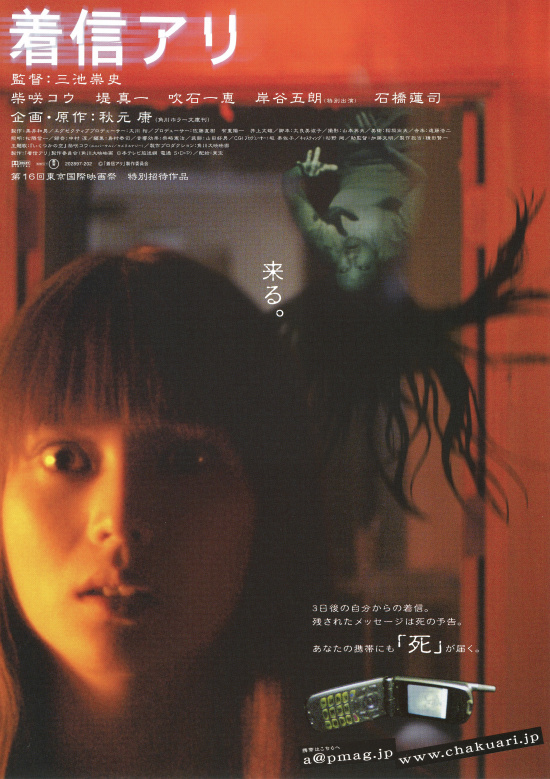
ONE MISSED CALL (CHAKUSHIN ARI)
(director: Takashi Miike; screenwriters: Minako Daira/Yasushi Akimoto/from the novel by Yasushi Akimoto; cinematographer: Hideo Yamamoto; editor: Yasuji Shimamura; music: Koji Endo; cast: Kou Shibasaki (Yumi Nakamura), Shin’ichi Tsutsumi (Hiroshi Yamashita), Kazue Fukiishi (Natsumi Konishi), Renji Ishibashi (Detective Motomiya), Goro Kishitani (Oka the Undertaker), Anna Nagata (Yoko Okazaki), Atsushi Ida (Kenji Kawai); Runtime: 111; MPAA Rating: R; producer: Naoki Sato; Tokyo Shock/Media Blasters Releasing; 2003-Japan-in Japanese with English subtitles)
“More annoying than answering a wrong number phone call.”
Reviewed by Dennis Schwartz
More annoying than answering a wrong number phone call. Schlocky maverick Japanese filmmaker Takashi Miike (“Zebraman”/”Audition”/”Visitor Q”), noted for his excesses in violence, keeps it stylish, filled with teenage girlie screams and technically efficient, but fails to keep the derivative J-horror film from being tedious and too somber. The film follows the same mainstream horror tracks as the Japanese “Ring” and South Korean “Phone.” This one rails against technology as being cursed and TV as an exploitation medium.
Yumi Nakamura (Kou Shibasaki, pop singer actress) is a college coed who has some kind of phobia linked with peepholes. That phobia is dropped as quickly as it’s raised but is to be continued later, as the story follows a handful of schoolgirl friends of Yumi as their cell phones begin forecasting their mysterious deaths 72 hours after receiving the fatal message. The first coed to die in this bizarre manner is Yoko (Anna Nagata), who jumps off a railway bridge. We soon learn the ominous call is said to come from “a woman who died, full of hate.” When Yumi’s new boyfriend Kenji mysteriously falls down an empty elevator shaft after receiving the fatal massage and g.f. Natsumi (Kazue Fukiishi) gets the same advance call, our heroine begins to get concerned and contacts a reality paranormal TV show since the police will not help. We’re led to believe that the nasty dead woman’s spirit has tranference powers through potential vics (Where’s Jung when we need him!).
The film becomes more playfully sinister and satiric when the panicked Natsumi agrees to go on the trashy TV show that will air at the exact time of her predicted death. In due time, a backstory of child abuse and unburied corpses gets revealed, as things soon become J-horror film predictable.
The commercial film, even though skillfully tacked together, presents a standard Japanese ghost story that’s made without passion or conviction and that’s all too familiar to be scary as its denouement couldn’t be more fake.
REVIEWED ON 9/16/2009 GRADE: C+